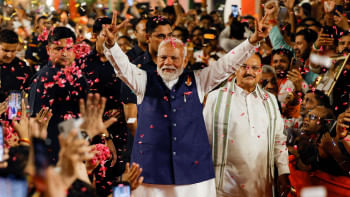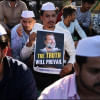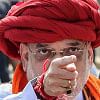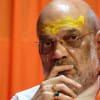An Indian election unlike any other in recent past

Over the last decade, there were perhaps few surprises as heartwarming to observers of India's democratic journey as the ones from its latest Lok Sabha election. The Indian election authorities rightly deserve kudos for successfully conducting the world's—and history's—largest democratic exercise that, over six weeks, saw 64.2 crore people vote, including a record 31.2 crore women. This in itself is a watershed moment that needs to be celebrated. The staggered election has also thrown up some big surprises, especially the ruling Bharatiya Janata Party's (BJP) failure to secure an outright majority for the first time since sweeping to power in 2014, as well as the rise of a strong parliamentary opposition.
The relative peace and enthusiasm that marked the election serve as a lesson for countries like Bangladesh where violence and poor voter turnout have become synonymous with the electoral exercise. It stands as a testament to people's power, and also the fact that a fair election is possible despite sharp ideological divides among the contesting parties. The election results, from that perspective, can be seen as a rejection of attempts to sully India's rich secular legacy. We have seen how the Hindutva and anti-immigrant rhetoric was used, especially by BJP, to rally voters behind its re-election campaign. While PM Modi is set to return to power for a rare third consecutive term, one hopes for the sake of ordinary Indians and the region at large that such divisive rhetoric will come to an end.
Perhaps the biggest surprise of all—and one that we can particularly relate to—is the resurgence of the Congress-led opposition alliance, INDIA, which secured 232 seats against BJP-led NDA's 293, as per latest counts. It is a defeat that feels more like a victory considering the last decade, as some observers said. We cannot deny the significance of a strong opposition in democracy. A strong parliamentary opposition ensures checks and balances, preventing any single party or leader from holding excessive power. By scrutinising government actions and policies, it holds the government accountable to the public. Without a robust opposition, democracy can become stagnant, unresponsive, and vulnerable to authoritarianism.
The Indian experience thus offers a lesson for Bangladesh where the lack of such an opposition has been acutely felt for long. Equally instructive has been the rebalancing of powers among coalition partners—with the BJP having to rely on allies it hardly needed before—which can also provide stability and a check not just in parliamentary affairs but also coalition politics.
The drama over the Indian election may not be over yet, as speculations over the formation of the next coalition government continue. As a neighbour and friend, it is our hope that Indian voters' desire to see a pro-people, pluralistic polity will be honoured regardless of what the next government looks like. We also hope that the two countries can continue on a path of mutual respect and growth in the coming days. As for those involved in Bangladesh's politics and electoral exercise, they can certainly take a leaf or two out of the Indian book.


 For all latest news, follow The Daily Star's Google News channel.
For all latest news, follow The Daily Star's Google News channel. 










Comments